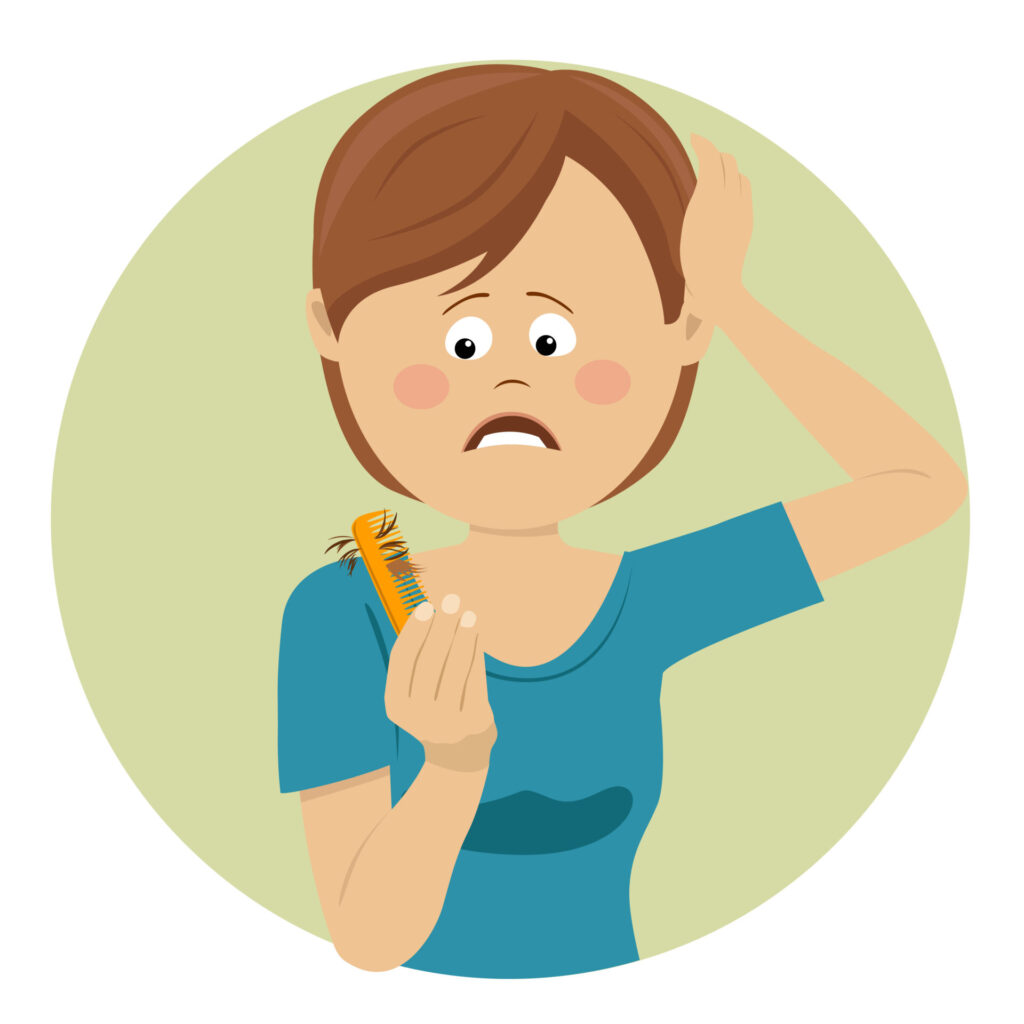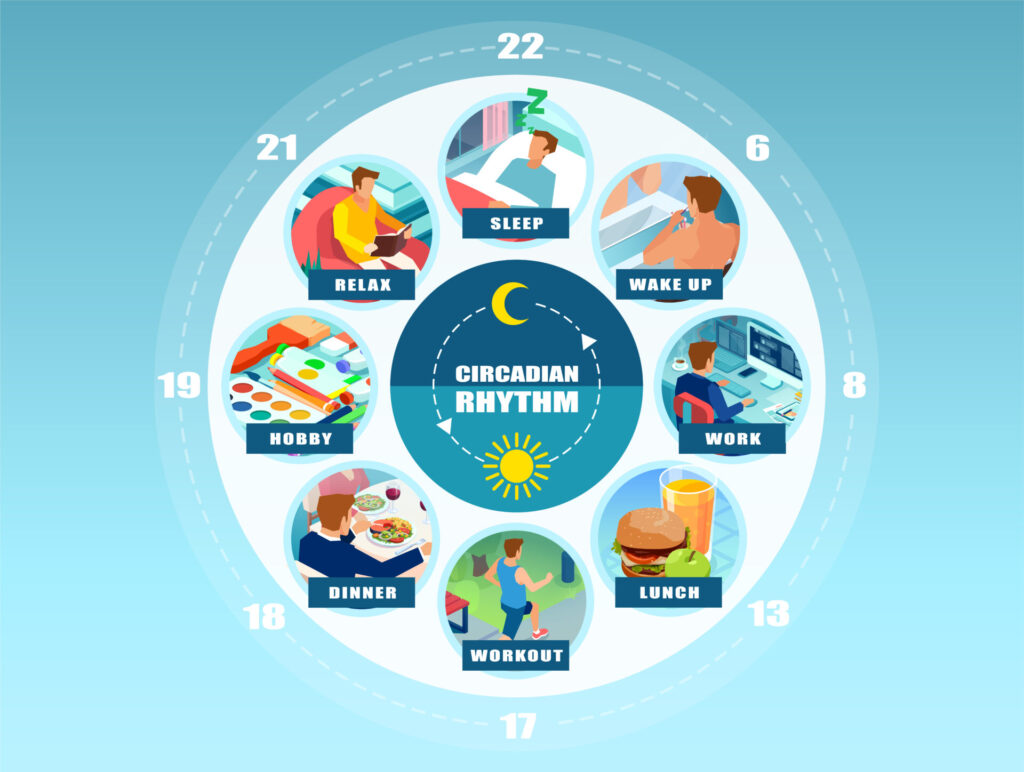
Hair loss can be caused by a multitude of factors, and there are many different types of hair loss. Hormone imbalance is a key contributor and affects both men and women, especially as our hormone levels fall during peri-menopause and into menopause.
Is your hair loss hormonal?
Your hormones act as messengers in your body, informing our muscles and organs how they need to work and when they need to take action. Finding the right balance can be difficult; a slight imbalance can cause issues with insulin production, cell growth, heart rate, general metabolism, etc. It can also cause hormonal hair loss.
-
- About half of the women start losing their hair by age 50. Estrogen and progesterone levels fall, and the effects of the androgens, male hormones, are increased.
- About two-thirds of men will experience some hair loss by age 35. Male-pattern baldness (androgenic alopecia) is responsible for about 95% of hair loss in men. High levels of androgens, including DHT, can shrink hair follicles as well as shorten this cycle, causing hair to grow out looking thinner and more brittle, as well as fall out faster.
- It is estimated that 22% of those with PCOS suffer from androgenic alopecia.
Common Causes:
Hormonal imbalance – This is a major cause of hair loss in both men and women. Certain triggers can accelerate the production of some hormones which cause hair shedding and hair loss.
Menopause – During menopause, a woman goes through a lot of changes in the body as the estrogen level drastically fall and since it is no longer capable of balancing DHT levels, it causes hair loss as well.
Insulin Resistance – This is caused when the body is unable to regulate blood sugar levels and insulin levels fluctuate. Studies suggest that insulin resistance can cause androgenic alopecia too.
Stress – When your body is stressed it produces a hormone called cortisol, which increases production of testosterone and DHT, and thus results in hair loss. This affects both men and women.
Thyroid levels – Fluctuations in thyroid levels can also be a catalyst for hair loss. Lack of sufficient parathyroid or an overactive thyroid can cause thinning of hair. So, it is important to get the thyroid levels checked regularly.
Pregnancy and childbirth – Pregnancy disturbs the hormones in your body and one of the results of these hormonal changes is thinning of hair eventually resulting in hair loss. But, this is a temporary condition, and you will notice regrowth of hair in a span of ninety days after your pregnancy..
Medications and the pill – Certain medications that you consume come with side effects such as hair loss as they cause disruption in the hormonal levels of the body, for example birth control pills. It is suggested to consult your doctor and either reduce the dosage of the medications you are consuming or find an alternative to it.
It is important to get the hormone levels back into balance as a primary strategy to stopping and preventing hair loss. Dealing with environmental / toxin stressors, is also vitally important for a holistic approach to treatment. This can be done with the support of a nutritional therapist incorporating functional, hormonal testing and addressing diet and lifestyle on a personalised level.
How to stop hair loss?
Stress Management
Stress is most undoubtedly one of the leading causes of hair loss. And it isn’t something that you can always escape. Every day, there are many things that can trigger the ‘fight or flight’ response in your body. However, you can prepare your body for it by trying different stress management techniques. This can also stop hormonal hair loss. These techniques can include:
- Physical exercise
- Mindfulness
- Meditation
- Yoga
- Deep breathing
- Taking breaks
- Doing things that make you happy
- Therapy/counselling
Healthy Eating
This is particularly important for healthy hair growth. If you’re suffering from nutritional deficiencies in addition to hormonal imbalance, the lack of essential nutrients will just worsen the problem. That’s why it’s important to have a balanced diet with vitamins, minerals, proteins, carbohydrates, and good fats. Avoiding processed food and ensuring a good supply of anti-oxidants is paramount.
Supplements
Fortunately, there are also a variety of nutraceuticals have been shown to be beneficial for thinning hair and loss, especially in the case of nutritional deficiencies. Here are just a few:
Silica: A nutrient that is the third most abundant trace mineral in the body. A study of 50 women given 10 mg of orthosilicic acid per day for 20 weeks found increased hair shaft thickness and improved strength, including elasticity and break load.
Biotin: a water-soluble essential nutrient associated with the B-vitamin family. It has been used for decades for improving the health of hair, as well as skin and nails.
Folate: Also known as vitamin B9, it helps with new-cell generation. Folic acid is believed to help hair follicles produce new hair.
Vitamin D: Low levels may be associated with female pattern baldness, according to some studies.
Saw Palmetto: It is an herb that may prevent testosterone from breaking down, which can help prevent hair loss.
Pumpkin Seed Oil: Is shown to block testosterone from transforming into dihydrotestosterone (DHT), a hormone associated with hair loss. Research shows that men who took pumpkin seed oil daily for six months saw a 40% increase in hair count!
Evening Primrose: It is a rich source of linolenic acid (LA) and gamma-linolenic acid (GLA), which may help with hair growth.
Grapeseed Oil: This is a source of linolenic acid, vitamin E, and flavonoids which help with hair growth.
Flaxseed: Either freshly grounded or in the form of oil, it is a natural source of vitamin E and omega‑3s, which promote hair growth.
Fish Oil (Omega‑3s): These fatty acids are some of the most-researched anti-inflammatory agents, important to consider as inflammation can be an underlying contributor.
Green Tea: This classic and subtle tea delivers high amounts of catechins (especially EGCG) that help lower levels of DHT and thus prevent the shrinking of hair follicles.
Finally…..
Hormonal hair loss in females can occur due to: cortisol, testosterone, estrogen and thyroid hormones. In these cases, hair loss is usually reversible, but occasionally it can be permanent. There are different medical treatments that you can speak to your doctor about, depending on which kind you’re dealing with, some are more effective than others.
However, it’s important to get to the underlying cause of your hair loss, which can be done with a functional medicine health assessment and testing your hormone levels. And you need to do that as soon as possible in order to prevent further hair loss and treat the existing one. If you try self-diagnosis and treatment, you can end up doing more harm than good to your hair.
If you would like support to get the bottom of your symptoms, then you should book a consultation at





0 Comments